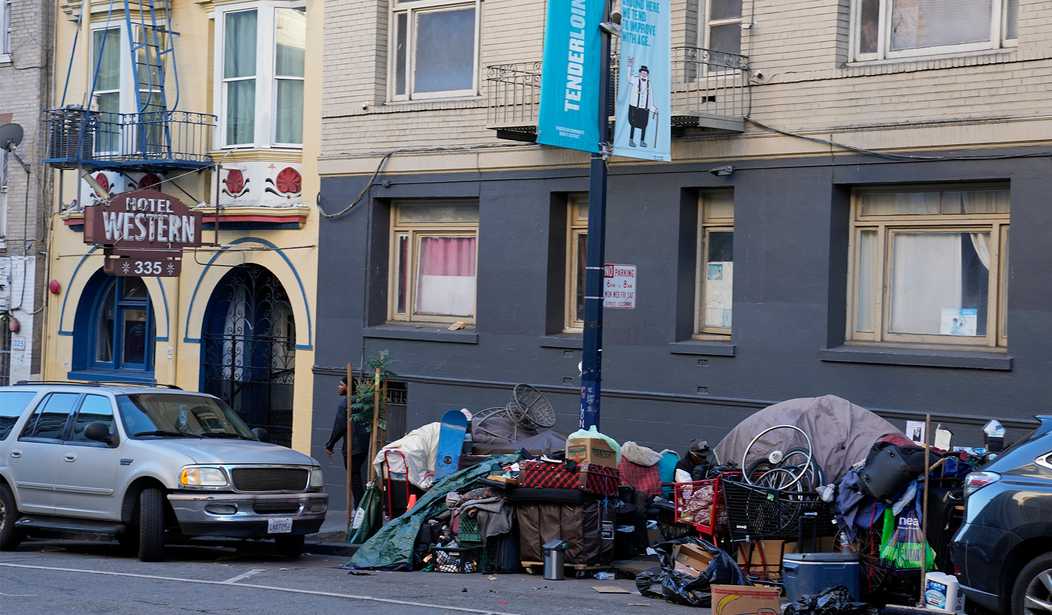Homelessness, addiction, and mental health. These three conditions often merge to create an intolerable situation for residents of big cities and the individuals afflicted with all three.
The San Francisco Chronicle reports on a man living on the street in the Mission District. In recent months, he has brought chaos to the neighborhood by assaulting people, setting dangerous fires, vandalizing businesses, and accosting people as they walk by.
He has been arrested four times over the last two months, and has repeatedly violated restraining orders. He's been in jail since early August, but residents fear that once he's released, he will continue his reign of terror.
San Francisco began a crackdown on homeless encampments last year, trying to entice people into shelters or treatment centers. The campaign met with limited success. While there are fewer encampments, the number of individuals living on the street has remained relatively constant. Despite several new intervention strategies and new programs to deal with the crisis in San Francisco, the problem continues to be the homeless people themselves. The "unhoused" continue to refuse to be housed, and those suffering from addiction keep refusing to take advantage of the treatments that are available.
This is not "blaming the victim." Each and every soul who lives in a city needs to take responsibility for his or her own condition and actions. Otherwise, you have dangerous chaos — the kind of chaos that residents of San Francisco are tired of having to live with and have had enough.
Several residents of the neighborhood where the homeless man is causing chaos wrote a letter to Mayor Daniel Lurie. He ran on a platform of improving the quality of life for San Franciscans. The letter from the residents blamed "the city’s 'permissive culture toward encampments' and an 'apparent breakdown in enforcement and accountability by city agencies'" for their misery.
Polls give Lurie generally high marks, although many residents and businesses in the Mission District do not share that opinion of Lurie. People living in the district "say serious problems continue to plague the neighborhood, including sex work, homelessness and public intoxication, and that the city needs to do more," reports the San Francisco Chronicle.
Lurie’s spokesperson Charles Lutvak said the mayor’s office is working with city agencies to “get dangerous people off the street” and to reduce homelessness.
“San Francisco does not tolerate violent behavior — if you put your neighbors at risk, you will be arrested,” Lutvak said in a statement.
Evan Sernoffsky, a spokesperson for the San Francisco Police Department, said in a statement that officers are in constant communication with the community regarding the man. The department has distributed information packets to city supervisors and officers at Mission Station with a copy of the man’s restraining orders and other documentation related to his cases, he said.
The problem caused by the man is not a crime problem, except that it is. It's not a homeless problem, except it is. It's not an addiction problem, except it is.
What makes this "quality of life" problem so difficult to address is not only the alphabet soup of federal, state, and local agencies all tasked with trying to address the problems above separately, but also a tangle of court cases that spell out conflicting do's and don'ts the city must follow.
It's a nightmare for any politician who must deal with angry residents, committed activists, and an overworked, understaffed bureaucracy that usually means well but is overwhelmed by the sheer enormity of the problem.
It’s unclear what kind of outreach or treatment city officials may have offered the man. Officials have a couple of newer avenues for pushing treatment on people experiencing mental illness or addiction, but they both have limitations and it’s unclear the man would qualify. To take part in CARE Court, for instance, a person must be diagnosed with schizophrenia spectrum disorder or another psychotic disorder and voluntarily agree to participate. Officials could try to place the man in a court-ordered conservatorship, but they must prove he is unable to care for himself and find an appropriate placement amid a shortage of locked beds.
The court system is little help to the residents trying to find a solution to the man's repeated violations of restraining orders and the inability of the police to protect residents.
When the man was taken to his court hearing on the restraining order violation, his lawyer argued that his mental illness prevented the man from knowing he was in violation. The judge wasn't buying it.
“He is thumbing his nose at the court,” Superior Court Judge Gail Dekreon said, “and he is a danger to the public.”
His next court date is Sept. 4. The neighborhood residents are on edge, knowing what the man is capable of. They aren't alone in their fear; this is a problem in every major city.
Until a more holistic approach to the trio of afflictions, including addiction, homelessness, and mental illness, is found, our cities will continue to be nearly unlivable except for the very rich.










